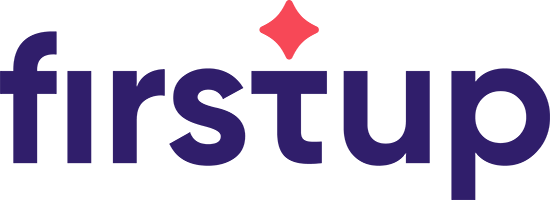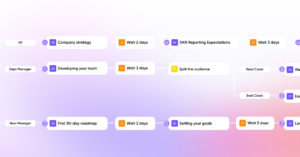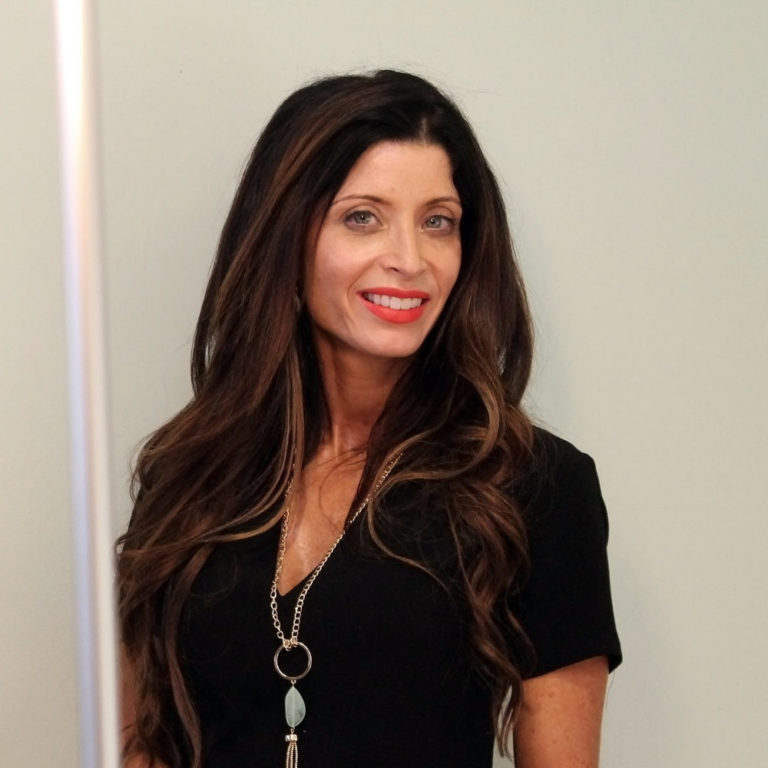Narrator: How do you care for the caretakers? For the doctors, nurses and staff who work all hours of the day and night to take care of injured and sick patients? Especially when their resiliency is being tested by the pandemic. But now, two years in, and healthcare teams have adapted to the challenges in front of them. They’ve found new avenues of communicating and new tools to manage the emotional labor that’s an essential part of their work. That’s what we’re talking about today with Jennifer Russo.
Jennifer Russo: “We’ve made order out of utter chaos. Right? Um, I think we’ve not frozen in the face of crisis. The team has instituted incredible programs and used energy in the face of disruption and genuinely brought reason to a season of madness. So I think how have we got above and beyond is, you know, we’ve not only kept going, but then we’ve sort of broken new barriers and, and that’s been incredibly inspiring.”
Narrator: Jennifer is the Senior Director of Corporate Communications and HR Strategy at Banner Health. There, she serves the clinician population, which makes up the bulk of employees – so doctors and nurses – but she also serves environmental services, culinary, and patient services as well as call centers, scheduling and back office employees. All-in-all, she’s communicating with tens of thousands of employees and working to ensure that Banner Health is a great place to work. And though she serves healthcare workers and teams, much of her thoughts on employee experience can be applied to any company. So mask up and have your ticket ready because Jennifer is showing us how to foster a caring and resilient workforce.
On Cruising Altitude, we talk about employee experience lessons from leaders at companies with over 30k employees. A lot like reaching Cruising Altitude at 30k feet, things look a little different when you’re managing 30,000 people. On this podcast, we bring you insights from the leaders who inhabit that rarefied air. Today’s episode features an interview with Jennifer Russo. But first, a word from our sponsor.
Jennifer Russo: I wear two hats. One is as the communications leader for a 55,000 person healthcare organization that operates in six states. The other is, uh, as a champion of the strategy that makes us a great place to work, someplace that people want to join and stay work that we label as HR strategy.
Narrator: Jennifer communicates with Banner’s 55,000 employees across six states: Arizona, California, Colorado, Nebraska, Nevada and Wyoming. And she’s communicating on behalf of the system. Now that we have an understanding of Jennifer’s role at Banner Health, let’s take a look at our itinerary and get to know more about Jennifer’s industry in The Flight Plan.
Jennifer Russo: I would categorize the employee personas at Banner Health in a very particular way. I think, regardless of their role, whether they are at the frontline or they are in a back office, this is a profession for people who really feel like this is their calling. What I have seen over the last several years and the last two in particular, is that people in healthcare have a great love of what they do, you know, of providing patient care, of being committed to quality outcomes, they are deeply passionate and compassionate people. I think the challenges we face in creating an employee experience are probably endemic to most industries and exacerbated by the pandemic. Probably the greatest challenge is that we have a workforce that is both wired and non wired. Or said another way, people that spend the bulk of their day at a desk behind a laptop and others who are busy at the front line, however you define that. And so it is really how do you reach that workforce, which is then further exacerbated, like I said, because of the way people were thrust home to work remotely in the last two years. You have to have the right structure in place. In our case, I report up through the structure of the Chief Human Resources Officer or the CHRO. And the job of my team is to inspire and amplify the impact of what the organization is doing to make it a great place to work. But I think at the end of the day, and I’ve really had quite a bit of time to reflect on this in the last few years, the employee is the one who really owns that experience. You know, we all have a lot of choices about how we show up and how we choose to participate and the myriad of offerings that our companies provide for us, whether it’s benefits and wellbeing or participation in DE&I, or flexible scheduling. And so at the end of the day, I think it’s actually the employee who owns that experience.
Narrator: Jennifer and the HR team look at the employee experience as a shared responsibility. They provide options and opportunities, and employees can choose what to participate in. And it takes both to commit to creating that experience. Let’s talk about what Banner Health does exceptionally well in First Class.
Jennifer Russo: I have a giant smile on my face because I am just so proud of the innovation I have seen within my team. So one is our video capabilities, which now includes storytelling and animation on really another level. And the poll for video is so extraordinary. Our video team had a year-over-year increase of almost 18% and the videos that they produced numbering into the hundreds. I think another one is how we’ve seized assets like, uh, we have digital signage in our hospitals or what we call acute care setting. And so we provide a monthly tation of messages that are informative and inspiring, but this was real estate that was really unused. And the team, uh, tapped into that and the vendor and came up with a process. I think we’ve deployed at least 12 rounds, but I think the one that stands out for me, and it’s ironic that we’re on a podcast, is our podcast.Um, it’s called What’s Buzzing. It’s named after our namesake internal all employee digital newsletter. We’ve produced 16 episodes. It’s a program that began as an idea. I think it would have been really easy to say no. How are we going to support that? How are we going to find a host? How are we going to make the technology work in our favor? But we’ve had our CEO twice on, did an episode with our president. We have people talking about benefits and patient experience and integrations and acquisitions, and it is just a really fantastic fun and engaging channel. And I think, you know, launching that in the midst of what’s been happening in the last few years has been so rewarding.
Narrator: So Jennifer and her team developed new and innovative ways to communicate so everyone – including remote workers – will be kept in the loop. And she aims to tailor the digital employee experience to be unique for each and every employee, but also recognizes that they’re still working towards that goal.
Jennifer Russo: How do you personalize the employee experience? Let’s face it, we all want that. And here’s what I think has complicated this. Every time we place an order now on these major consumer sites, um, and they, and it’s confirmed, they say, it’s ordered, Jennifer, in my case. And we get all excited and, you know, the AI and the technology behind that is mindblowing. And so I think it’s created this expectation. Uh, but I think let’s face it. We’re dealing with a workforce that is larger than the country of Morocco. You can’t do that. Um, so I think there’s a practicality in that. So what do we do? Well, our intranet, which is run by an amazing, uh, team that works in compliment to ours has some really cool custom features. When I log in, in the morning, it has, you know, content related to me and it’s personalized. And what our team has done incredibly well is wherever possible, when we are unearthing stories from inside our organization, uh, the monthly video series I talked about that’s now quarterly, and, you know, we dial up and down as needed, we recognize people by name. We recognize teams by name. On our podcasts, we call out individuals. We have contests and there are individual winners. So I think, you know, we do what we can with video, with written, with verbal. Um, but I think there’s an element of reality and expectation management about what is a personalized experience, um, when you’re not a consumer company. I think the way that we have defined the expectations in the last few years, generally speaking, but something I’m incredibly passionate about is quite frankly, we’ve made order out of utter chaos. Right? Um, I think we’ve not frozen in the face of crisis. The team has instituted incredible programs. Some of those best practices I shared with you and used energy in the face of disruption and genuinely brought reason to a season of madness. So I think how have we got above and beyond is, you know, we’ve not only kept going, but then we’ve sort of broken new barriers and, and that’s been incredibly inspiring.
Narrator: The Banner Health HR team has developed specific programs for employees based on whether they’re in-person, remote or hybrid..
Jennifer Russo: So our Work Your Way Program is an incredible example that has communications components, but it is about flexible scheduling. So everybody got thrust home, right. And there were options. Are you going to work fully from home where your job permits? Obviously people at the bedside can’t do that. Um, are you going to work hybrid, you know, both a combination of in and out of the office or ultimately, are you going to be a full-time in office, uh, employee? And so I think it’s that program and the work that goes into deploying something like that is unbelievable. The attestations, the policies, the equipments, the stipends, the it’s, it’s an unbelievable program to manage and then to track the data on success and see how it’s going. Another effort I have some incredible colleagues that launched, um, our Center for Healing, it’s a one-stop shop of resources. The things that our workforce is seeing, I mean, not to be glib, but, you know, this is disease and death on a level that I not sure most of us can relate to. Um, and so what are the resources to help them with their own mental well-being, their physical wellbeing? How about childcare when school has been closed? Um, and, and so the myriad of resources that team has assembled is, is just mind blowing. You know, there are on-site counselors. There is access to, uh, apps through the Virgin Pulse application. There is Calm. I listen every morning to a five minute sEG video segment. There are all kinds of topics on healthy eating and exercising and mindfulness and finding joy and stress relief. And it’s just unbelievable, the resources that have been assembled. And I think they are applicable to the entire population. I think those are again, incredible examples of innovation.
Narrator: What’s amazing is that Jennifer started her role in October of 2018, just months before COVID-19 was declared a pandemic by the WHO. But she brings with her her experience as General Manager of Communications and Communities at Rio Tinto, a mining company in Arizona.
Jennifer Russo:One of the experiences that probably stands out for me the most and set me up for this job is before I was here, I spent 16 years with a FTSE 500 global mining company. And that job afforded me the opportunity to absolutely become a global citizen. I traveled the world, I got a global education. Um, And I, I really had an opportunity to lean in and learn what it means to be empathetic and see the world through other people’s eyes.I lead an incredibly diverse team now and but for that experience, I think, you know, it, it really shaped who I am.
Narrator: Jennifer tunes into which employee experiences are working and which aren’t.
Jennifer Russo:It’s those feedback loops. So I think it’s somewhat anecdotal. And I think there is, there is leading indicators, like how much are people participating in things like digital town halls or reading your newsletters or providing you feedback? I think one of our aims is to also look at some of those lagging indicators, right? So w how are we helping to impact retention recruitment? Um, and those are all, uh, aspirations we have for our, for our data gathering
Narrator: Jennifer has lots of great ideas for creating that positive digital employee experience, but now let’s turn to the rougher, tougher employee experiences in our next segment, Turbulence.
Jennifer Russo: I think the worst experience I’ve seen is the mortgage company that just fired all those people on Zoom. I would absolutely never allow that to happen on my watch. I suspect that’s why a lot of those people left, you know, that had jobs like mine, but it, that is truly the worst thing I’ve seen. I would never name the company. Obviously it’s a public story. But I think it’s an example of what happens when you have all this new technology and people are not trained up on, these are still humans on the other side. We have to be mindful that just because we’re deploying a lot of technology does not mean that we are still not dealing with humans. And I think, you know, we saw that mortgage company that fired people on zoom and, you know, I would hope that would never happen on my watch, but I think it’s just an example of, um, the pace at which we’re moving. The stress at which people are under. And then, you know, the fact that the environment around us is shifting, but it’s still human beings. And so I just think never losing sight of that. It’s it’s the people.
Narrator: I love what Jennifer says here about remembering that you’re dealing with humans. It’s something that’s easy to forget when working with 55,000 employees, but it’s crucial to providing a positive employee experience. But even so, the past two years have been a serious challenge.
Jennifer Russo: I will tell you that we are a team that is always, um, doing on the job learning and pivoting, and nothing will test you more than that in a crisis. In the beginning of the pandemic, it felt like as a guidance from the CDC, the center for, uh, disease control was changing every eight minutes. And so we were trying to communicate in real time, because we felt that was our obligation. But the problem with that is it creates chaos. So, we looked for a solution and we ended up creating a series of what we call electronic huddles and bundles for our frontline and leader populations, respectively, with links to resources. That publication has just pivoted again, and now comes out on Fridays. The latest edition had a 95% open rate and an equally impressive read rate, but I think it was a great lesson in, it’s okay to not communicate instantaneously because you can unintentionally create chaos. So better to have a predictable cadence of communications that people can rely on, that are easy to digest, than this sort of rapid fire continuum. I reflect back to the earliest stages of the pandemic, because what happens is people are checking email at different times of the day and night. We have shift changes. And so when you’re communicating maybe guidance at 7:00 PM and then someone’s coming in at 7:00 AM with questions about that, but their leader hasn’t had the opportunity to digest that change, um, it can create a chaotic environment. So the key was getting on a predictable, reliable, accessible communications cadence.I will tell you having two boys, one, who’s a teen and once a preteen will, uh, strengthen your resiliency and, and you’ll have to learn how to be calm. So I probably had some training, uh, plus some global experience. You have to show up. My team showed up every day, oftentimes seven days a week. You have to be brave. Um, you have to lean in, people are under stress and duress and it’s your job when you have a job like I do. And my wider team is to give counsel and, and be brave in the counsel that you give, um, because you’re ultimately looking to make sure the audiences you are reaching have the right information and, and also to make sure the people providing it are credible, um, and that you don’t compromise that. You also have to acknowledge when things stink. Right? I mean, there were times where I said to my team, this stinks. We’re working seven days a week, uh, for a long, long time, months and months and months. Um, but you also have to celebrate the wins. We, uh, finally got to get together right before, uh, this latest variant. Uh, we were able to get some time and it was just joyous to celebrate all that the team has achieved. And I think you have to ask thoughtful questions and really empathize. You know, I think those are some of the things I call on as a leader. I think the other thing about leading is you’ve really got to empathize and, you know, empathy, I think is a word that gets thrown around a lot. But it’s a learned skill. Um, you know, I’m a mother. I’ve been doing this career a long time. I’ve traveled globally. All of those things have allowed me to learn what it means to empathize. I mentioned I have this team that is diverse in race, religion, sexual orientation. You know, they, I learn from them every day and, and their situations. And that allows me to be empathetic. And I think you can only become empathetic with life experience. And then and only then can you apply it to how you lead. It is not something you just wake up and are naturally empathetic. Right? I love my boys dearly, but it’s, that’s a skill they’re working on. Right? Cause right now the world sort of revolves around them. Um, and I think empathy is something it takes time to hone and is, is, uh, not an overnight thing.
Narrator: Jennifer has shared so much with us about supporting all Banner Health employees through the last two very challenging years in healthcare. She really has faced a trial by fire. And she has some parting advice for someone in her role for the first time.
Jennifer Russo: Yes, those technology and yes, the world around us has changed and will continue to evolve. But, you know what is the best thing you can do, is just listen. Because you will get so much out of listening to people. They want to tell you what’s on their mind. They act, they want to be part of the solution, even if you don’t think so at first. But just listen to people and you will be amazed at their insights. It will provoke questions and ideas. Um, I think people are hungry to be listened to. I think that’s what we’re seeing now play out in the world. So that’s my advice. Listen, use data. This craft is as much a science as it is heart. If you have a gut instinct, it’s probably right. And be brave. Be brave. You are there to add value. Don’t forget it.
Narrator: Being brave is a huge part of Jennifer’s job. She has led her team through the pandemic, a – hopefully – once in a lifetime experience. Her team has given employees options for engagement at work, support for their physical and mental wellbeing, and they’ve ridden the turbulence of the last two years-plus with them. Together, they’ve worked to become a more resilient and caring team
Thank you for listening to this episode of Cruising Altitude. This episode is brought to you by Firstup, the company that is redefining the digital employee experience to put people first and lift companies up by connecting every worker, everywhere with the information that helps them do their best work. Firstup has helped over 40% of the Fortune 100 companies like Amazon, AB InBev, Ford and Pfizer stay agile and keep transforming. Learn more at firstup.io




